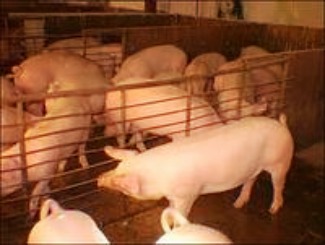New knowledge on the pandemic human H1N1 virus in pigs

The Virus Research journal recently published an article by CReSA scientists and showing that pigs exhibit some immunity to the pandemic virus A (H1N1) 2009 if you have previously been infected with other influenza viruses circulating in the herds, in this case, the european H1N1.
What will happen in the Spanish and European farms, which have a high prevalence of swine flu, if an outbreak of human H1N1 pandemic virus happens? This is the question which international agencies faced with a threat of great potential and that this research has answered. CReSA’s scientists conducted a study with different groups of pigs trying to analyze whether an infection of swine influenza A (H1N1) causes some immunity to subsequent infection of H1N1 human pandemic virus. The result were very mild pulmonary lesions and a subsequent increase in specific antibodies in the animals receiving both viruses. Therefore, there was a cross-protective effect among strains.
This study has allowed us to know a little more about the pandemic virus and how it may affect the pig sector.
References
"Experimental infection with H1N1 European swine influenza virus protects pigs from an infection with the 2009 pandemic H1N1 human influenza virus". Busquets N, Segalés J, Córdoba L, Mussá T, Crisci E, Martín-Valls GE, Simon-Grifé M, Pérez-Simó M, Pérez-Maíllo M, Núñez JI, Abad FX, Fraile L, Pina S, Majó N, Bensaid A, Domingo M, Montoya M. Vet Res. 2010 Sep-Oct;41(5):74. Epub 2010 Jul 29.

